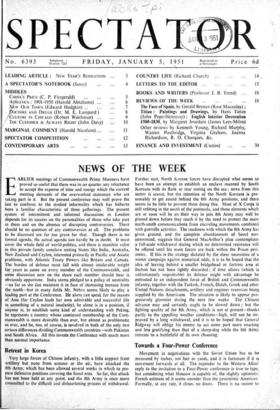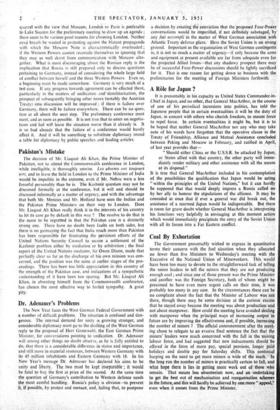Towards a Four-Power Conference
Movement in negotiations with the Soviet Union has to be measured by inches, not feet or yards, and it is fortunate if it is movement forwards at all. The rejoinder to the Western Allies' reply to the invitation to a Four-Power conference is true to type, but considering what Moscow is capable of, the slightly optimistic French estimate of it seems sounder than the pessimistic American. Formally, at any rate, it closes no doors. There is no reason to quarrel with the view that Moscow, London or Paris is preferable to Lake Success for the preliminary meeting to draw up an agenda ; there seem to be various good reasons for choosing London. Neither need breath be wasted in protesting against the blatant propaganda with which the Moscow Note is characteristically overloaded ; if the Western Powers cannot reconcile themselves to ignoring that they may as well desist from communication with Moscow alto- gether. What is most discouraging about the Russian reply is the implication that Russia is still prepared only to discuss questions pertaining to Germany, instead of considering the whole large field of conflict between herself and the three Western Powers. Even so, a beginning must be made somewhere. Germany is very much of a test case. If any progress towards agreement can be effected there, particularly in the matters of unification and'demilitarisation, the prospect of subsequently bringing other issues (notably the Austrian Treaty) into discussion will be improved ; if there is failure over Germany, there will be failure everywhere. There can be no ques-, Lion at all about the next step. The preliminary conference must meet, and as soon as possible. It is not true that to enter on negotia- tions and fail will leave the situation worse than it already is. It is so bad already that the failure of a conference would barely affect it. And it will be something to substitute diplomacy round a table for diplomacy by public speeches and leading articles.







































 Previous page
Previous page